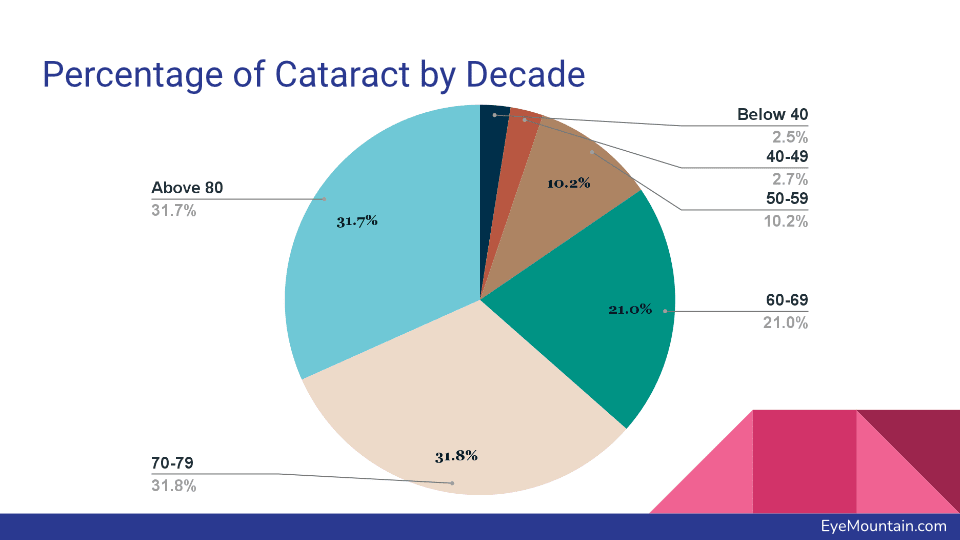Usually cataracts are synonymous with older age. And it is true. Most cataracts occur in your golden years. But not all…
It is entirely possible to get cataracts at a young age. Fortunately it isn't very common. Only about 5% of cataracts occur before the age of 50. There are a few known reasons why cataracts can develop and a few important risk factors to prevent you from developing cataracts at a young age.
But if you do develop a cataract, it isn't anything to necessarily worry about. Cataract surgery is very successful at removing the cataract and restoring your vision. But ideally, if you can prevent cataracts from developing earlier than they are supposed to, that's best way to go.
Are Cataracts At A Young Age Something To Worry About
The vast majority of cataracts "age-related" cataracts. What this means is that these cataracts develop over time with age. Because of this, the vast majority of cataracts happen as you get older. While it is not impossible, it is much less common to get cataracts at a young age.

Data courtesy of National Eye Institute
If we look at actual numbers, approximately 5% of all cataracts happen before the age of 50. Even when we extend the age up to 60, we are still taking about only 15% of all cataracts. This means that 85% of all cataracts occur after the age of 60.
Odds are that you aren't going to get a cataract at a young age. But it is possible. And there are a few things which can increase the risk of you getting a cataract at any age.
Some Cataracts Have Known Causes
If something causes the cataract, then of course it can happen at any age. And there are a few things which are known to cause cataracts.
- Trauma to the eye. If the lens gets damaged in an injury, it can get cloudy and form a cataract.
- Diabetes. High blood sugar places extra stress on the lens. Excess sugars can enter the lens causing the lens to swell up. While the lens can adjust somewhat to the excess sugars, eventually it has a harder time maintaining its health and cataracts can result.
- Steroid use. Steroids of any form, IV, pills, injections, nasal sprays, eye drops, when taken over a longer period of time can cause cataracts to form. While steroids can be helpful for many conditions in the short term, it is best to transition to different treatments for the long term.
- Radiation therapy. If you need radiation therapy for any reason around the head and eyes, you increase your risk of getting cataracts. In fact, it doesn't take that much radiation. Even exposure to low amounts of radiation over time (such as working as a radiation technologist) will also increase your risk of getting cataracts.
- Having surgery on your eyes can lead to cataracts. This is especially the case if you need any surgery inside your eye on your retina (such as surgery to repair a retinal detachment).
Some of these issues you just can't control for. Nobody wishes to get hit in the eye. Nobody wishes to need radiation treatment. But these conditions can happen and lead you to develop cataracts at an earlier age.
Increased Risk Of Early Cataracts
Beyond those known causes, there are also certain things which won't exactly cause a cataract but will increase your risk of developing a cataract over time and at an early age.
- Genetics does play a large role. If you have family members such as siblings or parents with early cataracts, you are at an increased risk of getting an early cataract yourself. Genetics can contribute up to 50% the risk of your cataract development. (see also How Much Are Cataracts Genetic?)
- If you are a smoker, you will have a greater risk of developing cataracts at an early age. Smoking can make you 50% more likely to develop cataracts earlier in life. (see also Does Smoking Make Cataracts Worse?)
- Finally, excess ultraviolet light exposure can increase your risk of developing cataracts. Thus, it is important to wear sunglasses to minimize this risk. Make sure the sunglasses are rated UV400 to block 99-100% of UVA and UVB light.
While you can't change your genetics, reducing your exposure to UV light and quitting smoking can help prevent the development of early cataracts
Some Cataracts Can Even Form in Children
So far we've been talking about early cataracts in younger adults. But cataracts can form at an even earlier age - during childhood. Infants can develop cataracts or develop them shortly after birth. These types of cataracts are known as congenital cataracts.
Congenital cataracts form slightly different from those found in adults. While in adults, cataracts result from the build-up of damage to the lens over time, in children, cataracts usually result as a defect in the structure of function of the lens. This can occur from a defective gene or from other developmental conditions. The lens doesn't form clear or just can't maintain its transparency.
While it is important to treat cataracts in adults, it is even more important to treat cataracts in children. Our vision develops gradually through our first 12 years of life. During this time, if the vision is impaired for any particular reason (such as cataracts), vision can fail to develop leading to a lazy eye or ambylopia. Thus cataract surgery is performed very early when cataracts are detected in children.
Summary
There will always be some individuals who develop cataracts at a younger age. While this won't be the majority, certain medical conditions such as diabetes or injuries to the eyes can cause cataracts. In addition, there are certain things, such as genetics, which can increase your risk of developing a cataract.
Like what you just read? Use Social Media?
Stay connected and join the discussion by following Eye Mountain on
Also Check Out: